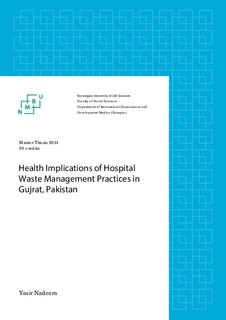| dc.description.abstract | The present research was conducted to investigate the health implications of hospital waste
management practices in Gujrat, Pakistan. For this purpose two government and two private
hospitals were randomly selected in the city of Gujrat. To find out the health implications, Sheikh
Sukha waste dumping site was selected. Personal visits were made to hospitals and waste
disposal site to record the actual conditions. Qualitative method was used in this research for data
collection.
For the collection of data twenty interviews were conducted (5 in each hospital) from hospital
staff. To investigate impacts of waste on health of people living around waste dumping sites, for
this purpose researcher visited Sheikh Sukha waste dumping site and a separate question guide
was prepared. Twenty respondents (10 male and 10 females) were selected and preference was
given to those who have some kind of infectious diseases.
Findings of this research illustrated that the overall implementation level of HWM rules 2005 in
terms of collection, segregation, storage, disposal and transportation in private hospitals were
much better than government hospitals due to their strict management, regular monitoring, proper
documentation, future planning, regular cleaning, less waste production and their tough
competition among themselves to achieve their financial targets. This research also revealed
TMA, collects all waste from hospitals. Get mixed with municipal waste then, finally disposed
of at Sheikh Sukha waste dumping site. However due to lack of proper waste management
system some chronic diseases such as headache, fever, skin and eyes allergies, Hepatitis C,
asthma, throat and lungs infections are very common especially among those people who are
living around Sheikh Sukha waste dumping site because of open waste dumping and burning.
Therefore, based on these findings, there is an urgent need to create awareness about hospital
waste management practices. Hospital administration should strictly focus on health education
and intensive training. In addition, the government of health should strictly enforce penalties
against the offenders. This research also suggests that rather than open burning and mixing of
infectious waste with municipal waste "Incineration" practices should be adopted. | nb_NO |

